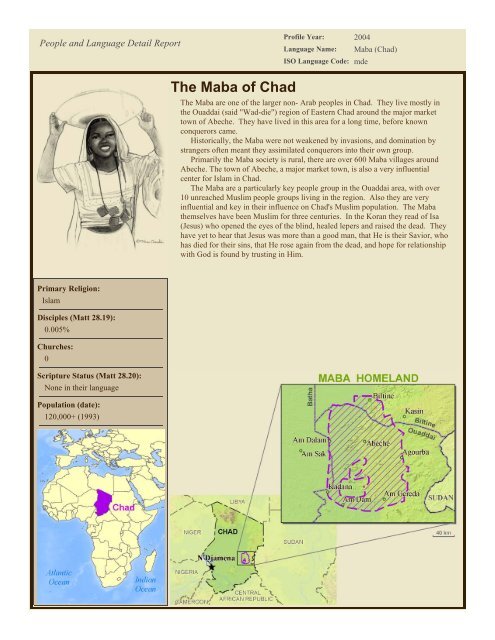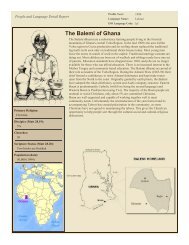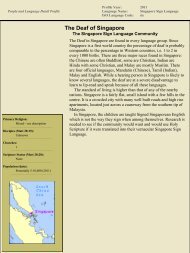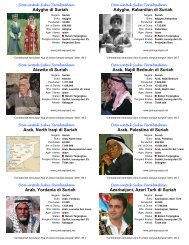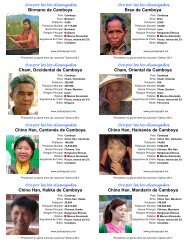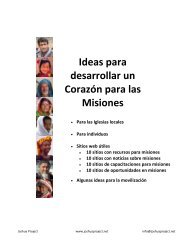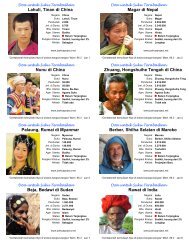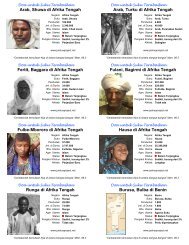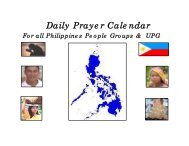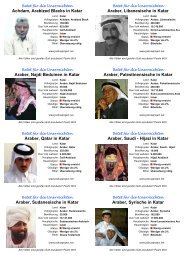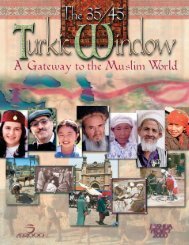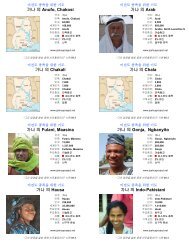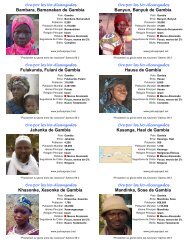expanded PDF profile - Joshua Project
expanded PDF profile - Joshua Project
expanded PDF profile - Joshua Project
You also want an ePaper? Increase the reach of your titles
YUMPU automatically turns print PDFs into web optimized ePapers that Google loves.
People and Language Detail Report<br />
Profile Year: 2004<br />
Language Name: Maba (Chad)<br />
ISO Language Code: mde<br />
The Maba of Chad<br />
The Maba are one of the larger non- Arab peoples in Chad. They live mostly in<br />
the Ouaddai (said "Wad-die") region of Eastern Chad around the major market<br />
town of Abeche. They have lived in this area for a long time, before known<br />
conquerors came.<br />
Historically, the Maba were not weakened by invasions, and domination by<br />
strangers often meant they assimilated conquerors into their own group.<br />
Primarily the Maba society is rural, there are over 600 Maba villages around<br />
Abeche. The town of Abeche, a major market town, is also a very influential<br />
center for Islam in Chad.<br />
The Maba are a particularly key people group in the Ouaddai area, with over<br />
10 unreached Muslim people groups living in the region. Also they are very<br />
influential and key in their influence on Chad's Muslim population. The Maba<br />
themselves have been Muslim for three centuries. In the Koran they read of Isa<br />
(Jesus) who opened the eyes of the blind, healed lepers and raised the dead. They<br />
have yet to hear that Jesus was more than a good man, that He is their Savior, who<br />
has died for their sins, that He rose again from the dead, and hope for relationship<br />
with God is found by trusting in Him.<br />
Primary Religion:<br />
Islam<br />
Disciples (Matt 28.19):<br />
0.005%<br />
Churches:<br />
0<br />
Scripture Status (Matt 28.20):<br />
None in their language<br />
Population (date):<br />
120,000+ (1993)
The Maba of Chad<br />
Item Name<br />
Have They Heard The Gospel<br />
Call Themselves Christian (%) 0%<br />
Item Note<br />
Believe In Jesus As God & Only Savior (%) 0.005%<br />
Prophet/Good Man, But Not God's Son (%) 99.995%<br />
Believe Jesus Is A Myth (%) 0%<br />
Number Of Pastors 0<br />
Number Of Missionaries Working 0<br />
Comment (Number Of Missionaries)<br />
Several in Abeche, but none specifically to the Maba<br />
Profile Summary<br />
Response To The Gospel<br />
Few have accepted Christ. Being a Muslim people group, there would be some<br />
apprehension regarding accepting teaching different to that in Islam. The Maba are<br />
known as an influential people group in the Ouaddai region of Eastern Chad. They<br />
have been Muslim for almost four centuries. The Maba are described as displaying a<br />
unity in their habitat, way of life and institutions.<br />
Number Of Communities >600<br />
Comment (Number Communities)<br />
Over 200 villages with over 500 inhabitants and about 400 smaller villages, mostly<br />
within 75-150 km of Abeche.<br />
Number Of Churches 0<br />
Is The Word Of God Translated<br />
Any Hinderance To Scripture Distribution<br />
Forms Of Gospel Presentation Available (Summary)<br />
No<br />
For translation to be effective, Literacy projects would be important. The literacy rate<br />
is at 7.5%; thus, a copy of Scripture would be illegible and intimidating to most Maba.<br />
None<br />
Population All Countries<br />
World Population For This People 135,000<br />
World Population (Date) 1993<br />
World Population (Urban Percent) 21%<br />
Comment (World Population)<br />
There may be as many as 10,000 living in Sudan.<br />
Group Description<br />
Countries Where People Group Lives<br />
Country Name<br />
Country Name<br />
Chad<br />
Sudan<br />
Group Description<br />
Geography & Environment<br />
Location<br />
Country<br />
Ecosystem Type<br />
Geological Type<br />
Longitude<br />
Latitude<br />
Climate<br />
Language & Linguistics<br />
Primary Language<br />
Comment (Alternate Names)<br />
Comments (Dialect)<br />
Second Languages<br />
Comment (On Other Mother Tongues)<br />
Comments (Related Languages)<br />
East Chad, Ouaddai prefecture, Abeche subprefecture, around to SW of Abeche.<br />
Chad<br />
Other<br />
Plains<br />
12-15 N<br />
20-22.3 E<br />
Dry seasons - Oct-March, Dry and very hot and dry April - May, Wet season - June-<br />
September<br />
MABA<br />
Group Description<br />
Group Description<br />
Kana Mabang, Ouaddai (outsiders name), Ouarai (Salamat Arab term), Bargo (Sudani<br />
and Massalit term).<br />
A survey showed that there is one type of Maba language spoken throughout the Maba<br />
population, and no dialects exist.<br />
ARABIC, CHADIAN<br />
Positive but lack confidence in the value of their own language, which many feel is<br />
inferior to Arabic.<br />
Marfa, Karanga, Kashmere, Massalit
The Maba of Chad<br />
Item Name<br />
Comments (Neighbor Languages)<br />
Item Note<br />
Marfa, Massalit, Assongori, Mararit, Beri (Zaghawa and Bideyat), Daza, AbCharib<br />
Literacy<br />
Comment (Attitude to literacy) average figures Ouaddai Prefecture, 1993<br />
Percent Literate For Men 14.5%<br />
Percent Literate For Women 2.6%<br />
Active Literacy Program<br />
Comment (Active Literacy Program)<br />
Publications In Vernacular<br />
Comment (Literacy)<br />
Economics<br />
Subsistence Type<br />
Average Annual Income<br />
Occupation<br />
Income Sources<br />
Products / Crafts<br />
Trade Partners<br />
Community Development<br />
Health Care (Quality)<br />
Comment (Health Care)<br />
Diet (Quality)<br />
Comment (Diet)<br />
Water (Quality)<br />
Comment (Water)<br />
Shelter Description<br />
Electricity<br />
Energy/Fuel (Quality)<br />
Yes<br />
Open for literacy in Arabic script but fairly unmotivated.<br />
Around 15 booklets on health and one on the history of the Ouaddai.<br />
The literacy percentage is based on the regional average (1996) and is expected to be<br />
lower in the villages and among women.<br />
Agriculturalists<br />
less than $450 per year (a Chadian average)<br />
Group Description<br />
Group Description<br />
Agriculture, animal husbandry, merchants. Kabartu clan are butchers and blacksmiths<br />
(haddads).<br />
Millet, Maize, Sorghum, Sesame, Beans, Peanuts, Okra, Cucumbers, Calabashes,<br />
Vegetables for condiments, Onion, Garlic, Chili, Tomato, Dried Tomato, Cotton<br />
(dying out)<br />
Mats, baskets<br />
Kajakse, Massalat, AbSharib, Mimi, Arabs, Beri, Daza, Kanembu, Kouka, Tama,<br />
Massalit, Asongori, Marfa<br />
Fair<br />
Group Description<br />
108,373 patients per doctor. One hospital in Abeche serves a large number of people.<br />
Many villages are far away from any sort of medical facilities or supplies.<br />
Fair<br />
Millet, Leaf sauces with dried meat - 'Kawal' leaf sauce is a specialty of the Maba.<br />
Will eat produce from fields and gardens.<br />
Fair<br />
Little irrigation except for gardens in the wadi, valleys irrigated by wadi in rainy<br />
season and by hand in dry season. Domestic water supply - there are some wells,<br />
some wadis by villages. Very few villages have pumps. In Abeche there are<br />
community taps, and some piped water to houses - Abeche water is of good quality.<br />
In towns: Rectangular mud brick housing with mud roof. In villages: Round straw<br />
huts, Mud walls not common.<br />
Electricity in some areas of Abeche. Not available in villages.<br />
Fair<br />
Comment (Energy)<br />
No electricity is available in most villages. Wood/Charcoal - is the main source for<br />
domestic fuel - for cooking and heat.<br />
Clothing<br />
The men wear long robes called 'jalabiyas', and occasionally a white turban.<br />
Women wear dresses covered by a light colored full body veil (laffay)<br />
when they leave the house.<br />
Transportation<br />
Donkeys, camels (occasionally), Market trucks, horses (ridden by men), occasionally<br />
horse carts, and on foot.<br />
Infant Mortality Rate 11%<br />
Life Expectancy<br />
63.4 years old<br />
Comment (Community Development)<br />
The area is open to development, though for community development will need<br />
motivation for their engagement.<br />
Comment (Community Development) Mortality, Life Expectancy, information is based on the regional average (1993).<br />
Society & Culture<br />
Group Description
The Maba of Chad<br />
Item Name<br />
Family Structures<br />
Neighbor Relations<br />
Authority / Rule<br />
Social Habits/Groupings<br />
Comment (Cultural Change Pace)<br />
Identification With National Culture<br />
Comment (Identification with National Culture)<br />
Self Image<br />
Item Note<br />
Extended family, patriarchal. Polygamy widely practiced - up to 4 wives are<br />
permitted. In villages 2 wives is more common. Women and men have separate<br />
living quarters.<br />
The mother has major responsibility to bring up the children and determining what<br />
tasks they are involved in.<br />
Traditional families divide into three groups in the dry/cold season.<br />
- The very old stay in the village with children of 4-10 years.<br />
- 16-25's - unmarried men and youth work with animals<br />
- 25-50's - work with young women and children 10-15 years of age in gardens.<br />
Good. Haddads (Blacksmiths) are not highly regarded. Won't marry Haddads or<br />
southern Chadians.<br />
The Maba sultan is the chief sultan for the entire Ouaddai Prefecture. (Inherited<br />
position) He is an 'Amir' (Great King). Other non-Maba cantons have Sultans too,<br />
who obviously work in co-operation with the Maba Sultan. Seven Meliks (canton<br />
chiefs) work on behalf of the Sultan in the Maba villages (inherited position) -<br />
collecting taxes, judging cases. Imams are selected for character and ability. Villages<br />
have two imams: one is a political role for the Chadian government. The other is a<br />
religious leader, who can be a different person to the 'faki' who is a Koran teacher.<br />
Market days are a special occasion.<br />
Urban - Rapid; Villages - slow<br />
Similar<br />
Near for Northern Chadian society.<br />
Prestigious<br />
Comment (Self Image) For the Maba, their language is a major feature distinguishing them from other people<br />
groups. The Maba are looked down on by Arabs, but looked up to by minority groups.<br />
Judicial / Punishment System<br />
Big cases are brought to the attention of the Sultan for his judgement. Payment of<br />
money is the main form of justice - families take the responsibility for payment. Other<br />
cases go to Maliks. Some form of payment settles a wrong. Depending on the<br />
offense, the shame or family honor are at stake.<br />
Celebrations<br />
Muslim festivals, Fete Nationale, Muslim feasts (Ramadan, Dahiye, circumcision,<br />
etc.) Threshing Millet - a few neighbors will get together to thresh the millet and<br />
make a feast of it with food and dancing.<br />
Recreations<br />
Media<br />
History Of People Group<br />
Youth<br />
Labor and tasks (6-12 year olds)<br />
Youth Greatest Needs (teens)<br />
Dancing, drinking tea, chatting<br />
15 minutes of Maba news each day from the Abeche radio station.<br />
In epochs a long time ago there were conflicts with sultanates of Darfour and<br />
Baguirmi, that are long resolved. After years of resistance the French conquered the<br />
area in 1911. Though there has been a long civil war in Chad, since 1990 things have<br />
been relatively peaceful. On the local front there are the usual conflicts with Arabs<br />
when their herds encroach on agricultural land.<br />
Children help with shepherding animals, and domestic work.<br />
Health and medicines for small children<br />
Group Description<br />
Education<br />
Comment (Primary Schools)<br />
Language Of Instruction Early Years<br />
Language Of Textbooks Early Years<br />
Comment (Language Of Instruction)<br />
Comment (Language Of Textbook)<br />
Comment (Education)<br />
Comment (Education)<br />
Church Growth<br />
Reached Status<br />
Reached Classification<br />
Most children go to Koran schools in the villages, instruction is in Classical Arabic,<br />
with explanation in Chadian Arabic.<br />
French<br />
French<br />
Arabic is another language of instruction.<br />
Arabic is another language of textbooks.<br />
French school system not liked and traditionally rejected. Arabic Lycée in Abeche,<br />
offers opportunity for bi-lingual education.<br />
The average number of those Maba who have received education is 6.7% in Ouaddai<br />
prefecture. (Chadian average 31%)<br />
Verified<br />
World A<br />
Group Description<br />
Status of Christianity
The Maba of Chad<br />
Item Name<br />
Item Note<br />
Total Baptized 2-3<br />
Bible Schools 0<br />
Christian Clinics/Hospitals 0<br />
Christian Literacy Centers 0<br />
Religion & Response<br />
Religious Practices & Ceremonies<br />
Attitude To Christianity<br />
Comment (Attitude To Christianity)<br />
Attitude To Religious Change<br />
Comment (Attitude Religious Change)<br />
Resistance / Receptivity<br />
Religious Analogies & Bridges<br />
Comment (Religion)<br />
Recommended Approaches<br />
Current Needs<br />
Items For Prayer<br />
Scripture<br />
Translation Status<br />
Available Scripture<br />
Scripture Use<br />
Comment (Scripture Use)<br />
Other Forms Of Gospel Available: Literature<br />
Other Forms Of Gospel Available: Recordings<br />
Other Forms Of Gospel Available: Film/Videos<br />
Other Forms Of Gospel Available: Radio<br />
Muslim feasts.<br />
Very resistant<br />
Fewer than 5 Maba are followers of Jesus.<br />
Very resistant<br />
In towns like Abeche - people are more closed - due to Islamic teaching. In the<br />
villages people are sometimes more open.<br />
Indifferent<br />
Islam along with their traditional religious world view may give ideas for analogies<br />
and bridges.<br />
Have been Muslim since the seventeenth century. Mosques are important places in the<br />
Maba communities. 'Gris Gris'are used a lot. These are charms and amulets, believed<br />
to ward off evil, sickness and generally protect those who wear them. The Sultanate<br />
of the Ouaddai has embodied pre-Islamic beliefs, though these may appear to be<br />
vanishing with Islam. The rites of enthroning the Sultan have included a tradition of<br />
the Sultan being recognized by the appearance of a snake, on a sojourn of several days<br />
on a particular mountain top, and the rites performed as well as the appearance of the<br />
snake transform this ordinary person into what is believed to be a divine person. The<br />
snake represents an ancient ancestor believed to be an immortal being.<br />
Some pre-Islamic beliefs are still part of the Maba culture, such as respect for the spirit<br />
of a mountain or tree, certain songs and dances. The last human sacrifice during the<br />
rituals of enthronement of the sultan took place in 1878 (According to<br />
Chappelle:151). Today animals are sacrificed and Islamic rituals observed.<br />
They are responsive to community and language development. - Living amongst them<br />
and being a positive witness for God's Kingdom.<br />
- Community Development - Health work may be an appropriate way to build rapport.<br />
- Bible translation<br />
- Learning Maba and Chadian Arabic would be essential.<br />
- Evangelism and church planting team with specific emphasis on working with the<br />
Maba people.<br />
- Many opportunities in medical work.<br />
For workers sent and for more to be sent out to work with the Maba.<br />
For translation of the Bible to take place. Pray for the enabling and protection of<br />
the health of those committed to this task.<br />
For Maba people to be ready to hear about Jesus as their Savior and that they would<br />
be prepared to open up their lives to Him.<br />
For the protection of those who are open and wanting to grow in the Lord and see<br />
others come to know Him too.<br />
For the growth of a strong fellowship amongst the Maba, celebrating and growing in<br />
their faith in Jesus.<br />
Definite<br />
None<br />
Unknown<br />
For translation to be effective, literacy projects would be important.<br />
No<br />
Yes, one cassette recording of the Gospel was made - 30 years ago.<br />
No<br />
No<br />
Status of Christianity<br />
Status of Christianity


